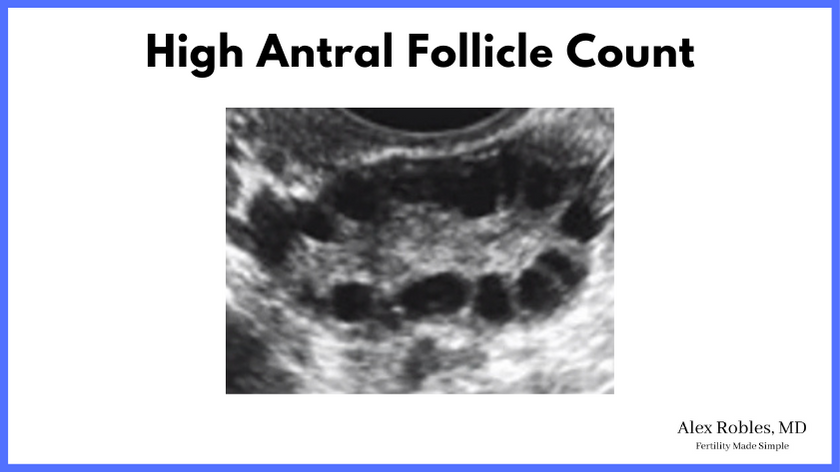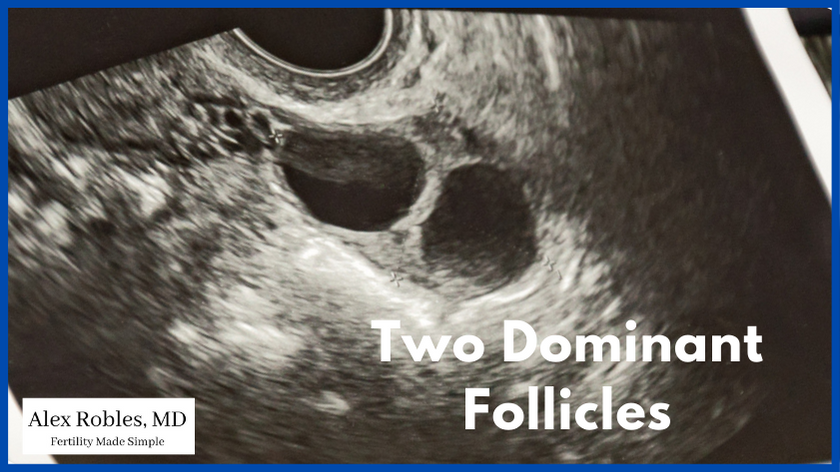What is an antral follicle count?
Why do we check it before doing an in vitro fertilization cycle?
What is a normal antral follicle count by age?
In this post, you will learn everything you need to know about antral follicle counts and what it means for you.
Let’s get started.

What Is An Antral Follicle Count?
Antral follicles are small fluid-filled sacs in your ovaries, each containing an egg. The antral follicle count (AFC) is the number of antral follicles visible on an ultrasound scan of your ovaries.
Fertility doctors use the AFC to estimate your ovarian reserve or the number of eggs you have left in your body.
In other words, it measures egg quantity, not quality.
What Does an AFC Tell You?
Together with other ovarian reserve markers, an AFC can help predict how you will respond to IVF treatment.
The higher your antral follicle, the more likely you will get a high number of eggs at retrieval.
The number of eggs we retrieve correlates with pregnancy rates after IVF.
How Is It Done?
An antral follicle count is typically performed using a transvaginal ultrasound scan.
A small ultrasound probe is inserted into the vagina to visualize the ovaries from multiple angles. We then count the number of follicles in each ovary (they appear as small black circles.)
We can also measure the size or diameter of each follicle. Only the follicles that measure between 2 and 10 millimeters (mm) are technically antral follicles.
To get the most accurate results, we must do the AFC early in the menstrual cycle, typically on cycle day 2 or 3.
The procedure is painless, but you might experience mild pressure or discomfort during the scan.
Is The Antral Follicle Count In Both Ovaries?
Yes, the AFC count is the sum of the follicles in both ovaries. The follicle count in both ovaries is typically similar, although there may be some variation between the two sides.
A lower than average count in one ovary may be due to a structural problem with the ovary, such as a cyst, endometrioma, or prior surgery.
What Is A Normal?
A normal antral follicle count is roughly 6-8 follicles per ovary. However, there is a lot of variety among patients, and this number naturally falls as you age.
With that said, it is essential to note that quantity isn’t the only factor; the quality of your eggs and sperm is also important.
What About By Age?
Younger women typically have a higher AFC than older women. For example, one study of over 1000 infertile women found that, on average:
- Women under 30 have an AFC between 15 and 25
- Women between 30-35 have an AFC between 12 and 20.
- Women between 35-40 have an AFC between 10 and 18
- Women over 40 have an AFC between 4 to 12
It is essential to remember that there is a wide range of “normal” and that the ideal number of follicles may differ from one woman to the next.
Women with polycystic ovary syndrome (PCOS) may have as many as 20 antral follicles per ovary, which is a risk of developing ovarian hyperstimulation syndrome.

Nevertheless, AFC declines with age due to gradual but consistent loss of oocytes every month. Unfortunately, there is no way to stop or slow the atresia, or decline of ovarian reserve.
Does A Low AFC Mean I Am Infertile?
A low AFC does not mean that you are infertile; instead, it indicates low ovarian reserve.
Women with a low AFC will likely need higher doses of medications if they choose to undergo ovarian stimulation. However, a very low count (<4) usually indicates that you will have a suboptimal ovarian response during an IVF cycle.
With that said, it’s important to remember that AFC is just one factor that contributes to fertility. Other factors include age, egg quality, uterine health, and more.
What Can Cause A Low AFC?
Many factors can cause a low antral follicle count, such as autoimmune diseases, endocrine disorders, genetic factors, and previous ovarian surgery.
However, the most significant contributor to a low AFC is age.
What Is A Good Number Of Antral Follicles For IVF?
A 2019 study of over 8000 infertile women that underwent IVF analyzed the cumulative probability of pregnancy based on antral follicle count.
They found:
- An average clinical pregnancy rate of 28% in women with an AFC of 4 to 8
- An average clinical pregnancy rate of 35% in women with an AFC of 9 to 12
- An average clinical pregnancy rate of 38% in women with an AFC of 13 to 17
- An average clinical pregnancy rate of 40% in women with an AFC of 18 or greater
A smaller study of 1000 women in 2012 found similar results for live birth rates.
Of note, women with an AFC of less than 4 did not have a live birth in this study.
What Is A Good Number For Clomid (IUI Cycle)?
For Clomid intrauterine insemination (IUI) cycles, there is no magic number of follicles that guarantees success.
However, many fertility doctors like to see one or two dominant or mature follicles before proceeding with IUI.
The more follicles you have, the higher your chances of getting pregnant; however, there is such a thing as too many follicles.
You are at higher risk for twins or triplets if you grow three or more follicles.

Can A Follicle Contain Two Eggs?
No, a follicle can only contain one egg. A follicle is a sac that develops around an immature egg and helps protect it as it grows.
Unfortunately, it is important to know that not every follicle yields an egg.
How Can I Increase My Antral Follicle Count?
Unfortunately, there is no proven way to increase your antral follicle count. However, some lifestyle and dietary changes might help maximize your fertility.
Firstly, avoid smoking at all costs, as the toxins in cigarette smoke will damage your ovarian reserve. Excessive alcohol consumption may also be harmful.
Secondly, eat plenty of fruits, vegetables, and healthy fats. These foods contain antioxidants and nutrients your body needs to function optimally.
Thirdly, take care of your body by getting moderate exercise and maintaining a healthy weight. Excessive exercise and extremes of body mass index (BMI) can interfere with ovarian function.
Finally, try to get enough sleep. Sleep deprivation can lead to high cortisol levels, which can inhibit your reproductive hormones.
While there is no guaranteed way to increase antral follicle count, making these lifestyle changes may improve your chances of success.
Are There Any Other Tests For Ovarian Reserve?
In addition to AFC, two other blood tests can give you information about your ovarian reserve.
Comprehensive ovarian reserve testing also includes:
- FSH blood test: FSH or follicle stimulating hormone (FSH) is the hormone responsible for stimulating follicle growth. A high FSH (>10) indicates low ovarian reserve.
- AMH: AMH or anti-müllerian hormone is a hormone produced by small follicles in the ovary. The more follicles you have, the higher your AMH. A low serum AMH level (<1) indicates low ovarian reserve.
Most fertility specialists will check all three tests to help determine your overall fertility potential.
Final Words
In conclusion, antral follicle count is one of the most significant factors contributing to fertility. A low AFC does not necessarily mean you are infertile, but it does have a significant correlation with a poor response to IVF and a lower probability of pregnancy.
While some lifestyle factors you can make to maximize your health, age is the most significant factor in determining follicle counts and reproductive potential.
If you have any questions or concerns, contact our office and schedule a consultation.
Other Related Posts on Fertility Treatments:
- When Should You See A Fertility Doctor? (15 Common Reasons)
- Ovarian Follicles: What Are They & Which One Becomes The Dominant Follicle?
- The Egg Retrieval: What To Expect
Make An Appointment With Dr. Robles To Discuss Your Fertility Options Today!

Alex Robles, MD
Dr. Alex Robles is a Spanish-speaking Latino-American Reproductive Endocrinologist and Infertility specialist in New York City, and a board-certified OBGYN. He has a special interest in health, lifestyle, & nutrition. Make an appointment with Dr. Robles to discuss your fertility options today!
